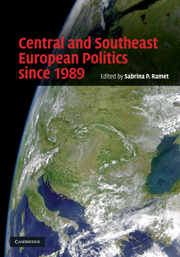Book contents
- Frontmatter
- Contents
- List of figures and maps
- List of tables
- Notes on the contributors
- Preface
- List of acronyms and abbreviations
- Guide to pronunciation of Central and Southeast European words
- 1 Central and Southeastern Europe, 1989
- 2 Central and Southeastern Europe, 2009
- Part 1 Introduction
- Part 2 Issues
- Part 3 Central Europe
- Part 4 Yugoslav Successor States
- Part 5 Southeastern Europe
- 17 Romania: in the shadow of the past
- 18 Bulgaria since 1989
- 19 Albania since 1989: the Hoxhaist legacy
- Part 6 Former Soviet republics
- Part 7 Present and future challenges
- Index
- References
19 - Albania since 1989: the Hoxhaist legacy
Published online by Cambridge University Press: 05 June 2012
- Frontmatter
- Contents
- List of figures and maps
- List of tables
- Notes on the contributors
- Preface
- List of acronyms and abbreviations
- Guide to pronunciation of Central and Southeast European words
- 1 Central and Southeastern Europe, 1989
- 2 Central and Southeastern Europe, 2009
- Part 1 Introduction
- Part 2 Issues
- Part 3 Central Europe
- Part 4 Yugoslav Successor States
- Part 5 Southeastern Europe
- 17 Romania: in the shadow of the past
- 18 Bulgaria since 1989
- 19 Albania since 1989: the Hoxhaist legacy
- Part 6 Former Soviet republics
- Part 7 Present and future challenges
- Index
- References
Summary
When Enver Hoxha, Albania's long-time Stalinist dictator, was buried with honors under the socialist realist statue of Mother Albania in the Martyrs' Cemetery in Tirana, the date of his death was omitted from his tombstone. Ramiz Alia, who followed Hoxha as party secretary, was responsible for the omission, arguing that such a man could never die. Unfortunately for Albania, still mired in its transition and heavily influenced by its Stalinist past, Alia may have been right. Certainly the most brutal aspects of the Hoxha regime, including its state-of-siege isolation, its political murders, its prisons, its forced labor camps, and the hardships of long internal exile are gone. But aspects of its intolerant authoritarianism, the general disregard for the well-being of its people and the best interests of the state on the part of the elite, brutal uncompromising politics, and lack of a rule of law, have obstructed the path to Albania's broadly articulated goals of establishing a functioning democracy and market economy, and Euro-Atlantic integration.
The Hoxha regime
That the Hoxha period left a profoundly negative impression on post-communist Albania is clear. Still, some historians have credited him with achievements in specific areas such as health, education, and women's rights. Despite grinding poverty, he did diversify the economy and society through a program of Soviet-style industrialization, he raised the standard of living, and he reduced the impact of divisive factors on Albanian society, such as regional and clan loyalties, the traditional north–south division, and the occasional tension associated with the presence of four distinct religious groups.
- Type
- Chapter
- Information
- Central and Southeast European Politics since 1989 , pp. 421 - 444Publisher: Cambridge University PressPrint publication year: 2010
References
- 6
- Cited by



